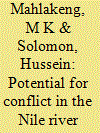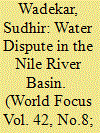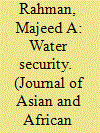|
|
|
Sort Order |
|
|
|
Items / Page
|
|
|
|
|
|
|
| Srl | Item |
| 1 |
ID:
150542


|
|
|
|
|
| Summary/Abstract |
Home to more than 160 million people, the Nile River Basin has become one of the hotspots of the global quest for food, water and energy security. Moving closer to its completion, the Grand Ethiopian Renaissance Dam (GERD) highlights the interplay between the food, water, and energy sectors and their implications on geopolitical power relations in the region. Despite Ethiopia having the highest volumetric contribution to the Nile river flow, Egypt has maintained hydro-hegemony over the basin for several decades on the basis of historical claims and colonial agreements. Egypt has stated that its volumetric share of the Nile’s water is not sufficient to sustain its growing population, declaring water availability a matter of national security. However, for Ethiopia, the GERD represents a crucial moment in its development agenda, acting as both a counterhegemonic power play, as well as a means to improving the hydropower capacity of the country, and ensuring future food security. This paper explores the various hegemonic and counter-hegemonic strategies employed by Egypt and Ethiopia respectively, highlighting the various ways in which food, water, and energy concerns are intrinsic components of the asymmetric power configurations of the Nile River Basin. By navigating the debate surrounding the GERD, this paper highlights the necessity of incorporating the food, water, and energy nexus into studies of hydro-hegemony and counter-hegemony. This allows the future policy direction for nexus management and governance in the Nile River Basin to move beyond benefit sharing, instead steering towards power sharing.
|
|
|
|
|
|
|
|
|
|
|
|
|
|
|
|
| 2 |
ID:
138042


|
|
|
|
|
| Summary/Abstract |
Since the end of the twentieth century, the realm of international relations has been characterised by resource geopolitics - the potential for conflict as a result of the scarcity of vital resources that cross political boundaries.
|
|
|
|
|
|
|
|
|
|
|
|
|
|
|
|
| 3 |
ID:
179643


|
|
|
|
|
| Summary/Abstract |
Many ancient civilizations center found on famous rivers — the Euphrates and the Tigris (Babylon), the Yangtze (China), the Ganges (India), and the Nile (Egypt) (Hussein 2014). The famous Greek historian Herodotus wrote in the fifth century B.C., ‘Egypt is the gift of the Nile’ (Swain 1997: 676). The Nile River basin act as ideal case studies to ask the following questions: 1) How do riparian states in transboundary basins achieve water security, and 2) In the face of increasing water scarcity, will efforts to achieve water security lead to increased conflict throughout the region or will they lead riparian states to cooperate in an effort to conserve their shared water resources? To answer these questions, importance given to the hydrogeography, history, and hydropolitics of the basins and riparian states (Ward and Roach 2010: 52).
|
|
|
|
|
|
|
|
|
|
|
|
|
|
|
|
| 4 |
ID:
121828


|
|
|
|
|
| Publication |
2013.
|
| Summary/Abstract |
This article examines the transboundary water challenges among riparian states in and around the Nile river basin. The article argues in agreement with the Collier-Hoeffler conflict model (1998) which claims that Africa's natural endowments, such as diamonds, gold, copper, bauxite, and oil, are strong predictors of violent conflict in Africa. This article further posits that these natural economic endowments, such as natural resources and geographical locations which include the Nile river basin, are potential triggers of conflict in the horn of Africa.
|
|
|
|
|
|
|
|
|
|
|
|
|
|
|
|
|
|
|
|
|